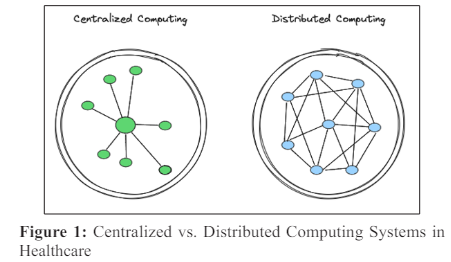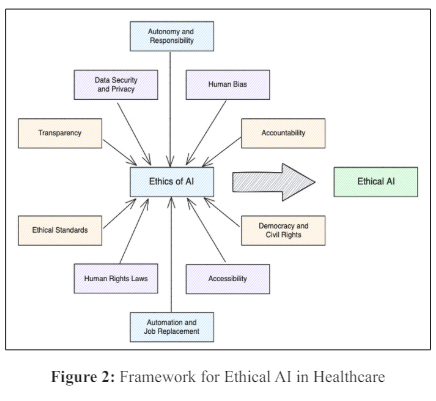Author(s): Abhishek Shende
This research paper delves into the innovative integration of artificial intelligence (AI) and distributed computing within dental healthcare management, marking a pivotal advancement in the field. We explore the synergistic potential of AI algorithms and distributed systems in revolutionizing dental diagnostics, treatment planning, and patient data management. The paper elaborates on the utilization of machine learning models for predictive analytics in oral health, and the implementation of distributed architectures to ensure robust, scalable, and secure data handling. Emphasis is placed on AI-driven customization of patient care, enhancing accuracy and efficiency in dental practices. Challenges such as ethical considerations, data privacy, and the need for seamless human-AI collaboration are critically examined. This comprehensive study not only showcases cutting-edge technological advancements but also paves the way for transformative changes in dental healthcare delivery, underlining the vital role of AI and distributed computing in shaping the future of dentistry.
The integration of Artificial Intelligence (AI) and distributed computing in dental healthcare represents a transformative leap in technology application, echoing a wider digital evolution across health disciplines [1-3]. AI’s role in enhancing dental diagnostic precision, optimizing treatment plans, and elevating patient experience is increasingly evident [1,2]. Parallelly, distributed computing brings robust solutions to data management challenges, ensuring enhanced security, scalability, and efficiency [4]. The synergy of these technologies in dental healthcare not only addresses contemporary challenges but also lays the foundation for future advancements, redefining the landscape of dental care delivery and management [5,6].
This study aims to comprehensively explore the amalgamation of AI and distributed computing in the dental healthcare sector. The primary objectives are:
Artificial Intelligence (AI) in healthcare has transitioned from a conceptual innovation to a practical tool that is reshaping medical practices, including dentistry [1,2]. AI, especially through machine learning, significantly enhances diagnostic accuracy, treatment efficiency, and patient care quality, offering early diagnosis and personalized treatment solutions.
Distributed computing plays a crucial role in healthcare data management, characterized by a network of interconnected computers [4]. This system provides a scalable, secure, and efficient framework for managing large volumes of sensitive healthcare data, enabling real-time data access and processing. Figure 1, illustrates the structural differences between these computing models.
The convergence of AI and distributed computing enhances healthcare system capabilities and efficiency [1,4,5]. This integration permits rapid analysis of extensive datasets while ensuring data integrity and security. In dental healthcare, this combination leads to significant advancements in care delivery and management, offering advanced personalized care and efficient practice management.

AI’s role in dental diagnostics and treatment planning is transformative, offering significant enhancements in precision and patient-specific care [1,2]. Machine learning algorithms are particularly adept at analyzing complex dental imaging, facilitating early detection of conditions like dental caries, periodontal diseases, and oral cancers. AI-driven tools assist in formulating accurate, personalized treatment plans, optimizing patient outcomes and streamlining dental practice operations.
Distributed computing revolutionizes dental data management by providing scalable, secure, and efficient systems [4]. It ensures the integrity and confidentiality of sensitive patient data, facilitating its access and sharing across different dental healthcare platforms. This technology supports real-time data analysis and decisionmaking, enhancing the overall quality of dental care. For a detailed comparison between traditional and distributed data management systems in dental healthcare, refer to Table 1: “Comparative Analysis of Traditional vs. Distributed Data Management in Dental Healthcare”.
Real-world implementations of AI and distributed computing in dental healthcare illustrate their practical benefits and potential challenges. For instance, AI-driven diagnostic tools have shown significant success in accurately identifying dental pathologies, leading to more effective treatment strategies. Similarly, distributed computing systems have been pivotal in managing patient data across multiple dental clinics, ensuring seamless, secure data transactions. These case studies underscore the practical viability and transformative impact of these technologies in modern dental healthcare.

In the realm of AI and distributed computing for dental healthcare, the imperative for data privacy and security is heightened [4]. The sensitive nature of patient data demands stringent protocols and robust encryption to prevent unauthorized access and breaches. Adherence to legal frameworks, such as HIPAA, is critical in ensuring the protection of patient information.
Ethical considerations in AI, as outlined in Figure 2, are central to its application in healthcare, especially in dentistry [2]. This framework emphasizes the importance of addressing challenges such as transparency, data security, autonomy, human bias, accountability, ethical standards, human rights laws, automation impact on jobs, accessibility, and democracy and civil rights to achieve Ethical AI. Ensuring AI systems are devoid of biases and maintaining transparency about their role and limitations are fundamental for ethical AI deployment in patient care.
The integration of AI and distributed computing into current dental healthcare systems is laden with challenges [1,3]. These span technical issues, like system compatibility, and operational concerns, including staff training and workflow modification. A seamless integration, maintaining continuity of care and leveraging the advancements these technologies offer, is crucial for their successful implementation in dental practices.

Emerging trends in AI and distributed computing point towards more advanced, interconnected systems with enhanced capabilities in data analysis and real-time decision-making [1,5]. Developments such as deep learning and edge computing are set to further refine the precision and efficiency of dental healthcare services.
The continued evolution of AI and distributed computing is poised to significantly impact dental healthcare, promising more personalized and efficient patient care [2,6]. Advancements in these technologies will facilitate better disease prediction, treatment planning, and patient management, reshaping the future of dental practice.
Further research should focus on optimizing the integration of AI and distributed computing in dental healthcare, addressing current limitations and exploring new applications [3]. Studies on enhancing data security, reducing biases in AI algorithms, and improving the adaptability of these technologies in diverse dental healthcare settings are recommended. Additionally, research into patient and practitioner acceptance and the ethical implications of AI in dentistry will be crucial for successful implementation.
This study has extensively explored the integration of AI and distributed computing in dental healthcare. Key findings indicate that AI enhances diagnostic accuracy and treatment planning, while distributed computing improves data management and security [1,4]. The combination of these technologies promises a more efficient, precise, and patient-centric approach in dental practices.
The implications for dental healthcare practice are profound. The adoption of AI and distributed computing technologies is set to revolutionize dental diagnostics, treatment procedures, and patient data management, leading to improved patient outcomes and practice efficiency [2,5].
The future of dental healthcare will be significantly influenced by the ongoing advancements in AI and distributed computing. Continuous research and development in these fields will further enhance their applications in dentistry. It is imperative to address the challenges and ethical considerations associated with these technologies to fully realize their potential in improving dental healthcare [3,6].
